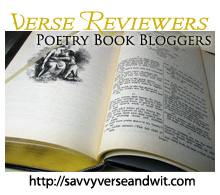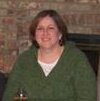
Last week, I was able to head into Washington, D.C., to the Library of Congress with a friend and see Trethewey give the inaugural reading for the literary season. She read from her latest collection, Thrall.
There is nothing like hearing a poet read from their own collection to make you want to buy it and read it for yourself and see the words drape the page. If you’re interested, here are my impressions of the event.




 As a last profile in honor of Book Blogger Appreciation Week, I sent over a few interview questions to Julie at
As a last profile in honor of Book Blogger Appreciation Week, I sent over a few interview questions to Julie at 


 To that end, I sent over a few interview questions to one of my blogging and Indie Lit Award judging buddies, Lu from Regular Rumination. She’s one of the first bloggers I noticed posting about poetry, so I think it’s appropriate that she’s the one I profile today.
To that end, I sent over a few interview questions to one of my blogging and Indie Lit Award judging buddies, Lu from Regular Rumination. She’s one of the first bloggers I noticed posting about poetry, so I think it’s appropriate that she’s the one I profile today. Tell us a little bit about the Read More/Blog More Poetry project (click on the image to learn more) that you started at Regular Rumination and what inspired you to start it and how has participation been? What are some upcoming events associated with the project?
Tell us a little bit about the Read More/Blog More Poetry project (click on the image to learn more) that you started at Regular Rumination and what inspired you to start it and how has participation been? What are some upcoming events associated with the project? This is my 66th book for the New Authors Reading Challenge 2012.
This is my 66th book for the New Authors Reading Challenge 2012.




